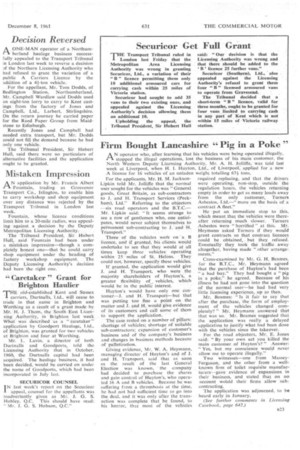Firm Bought Lancashire "Pig i g n a Poke
Page 57

If you've noticed an error in this article please click here to report it so we can fix it.
AN operator who, after learning that his vehicles were being operated illegally, stopped the illegal operations, lost the business of his maid customer, the North Western Deputy Licensing Authority, Mr. A. H. Jaffe, was told last week at Liverpool, when H. 1. Huyton, Ltd., of Liverpool; applied for a new A licence for 16 vehicles of an unladen weight totalling 674 tons.
For the applicants, Mr. H. M. JacksonLipkin told Mr. Jolliffe that the normal user sought for the vehicles was "General goods, Great Britain, as sub-contractors to J. and H. Transport Services (Peckham), Ltd." Referring to the objectors —six road operators and the B.T.C.—
Mr. Lipkinsaid: it seems strange to see a row of gentlemen who, one anticipates, would never subject themselves to permanent sub-contracting to J. and H. Transport."
Three of the vehicles wer'e on "a B licence, and if granted, his clients would undertake to see that they would at all times keep three vehicles operating within 25 miles of St. Helens. They could not, however, specify these vehicles.
If granted, the application would give 1. and H. Transport, who were the majority shareholders of Huyton's, a greater flexibility of_ vehicles, which would be in the public interest.
Huyton's would have only one customer—J. and H. Transport—but that was putting too fine a point on the matter and J. and H. would give evidence of its customers and call some of them to support the application.
The case rested on a number of pillars: shortage of vehicle; shortage of suitable sub-contractors: expansion of customer's business and of the company's business and changes in business methods because of palletization.
Giving evidence, Mr. W. A. Heymann, managing director of Huyton's and of J. and H. Transport, said that as soon as the result of the last General Election was known, the company had decided to purchase the shares and gain control of Huyton's, who operated 16 A and B vehicles. Because he was suffering from a thrombosis at the time, he had not had sufficient time to go into the deal, and it was only after the transaction was complete that he found, to his horror, that most of the vehicles required replacing, and that the drivers were operating, non-stop, outside the regulation hours, the vehicles returning empty in order to get as many loads away from the only customer, Turners Asbestos, Ltd.—" more on the basis of a contract A fleet."
He put an immediate stop to this, which meant that the vehicles were thereafter returning much slower. Turners Asbestos were " horrified" at this. Mr. Heymann asked Turners if they would grant contracts so that contract licences could be obtained, hut they refused. Eventually they took the traffic away altogether, having made "other arrangements."
Cross-examined by Mr. G. H, Beanies, for the B.T.C., Mr. Heymann agreed that the purchase of Huyton's had been "a bad buy." They had bought a "pig in a poke,". he agreed. Because of his illness he had not gone into the question of the normal user—he had had very little licensing experience, .up to then.
Mr. Beames: " Is it fair to say that after the purchase, the form of employment of the vehicles changed completely? " Mr. Heymann answered that that was so. Mr. Beames suggested that the application was really a delayed application to justify what had been done with the vehicles since the takeover.
For the road objectors, Mr. E. Jones said: "By your own act you killed the main customer. of Huyton's?" Answer: "Yes, but my conscience would never allow me to operate illegally."
Two witnesses—one from MasseyFerguson, and the other from a wellknown firm of toilet requisite manufacturers—gave evidence of expansions in their business, and stated that on no account would their firms allow subcontracting.
The application was adjourned, to be heard early in January.
(See further comments in Licensing Casebook, page 6423




































































































































